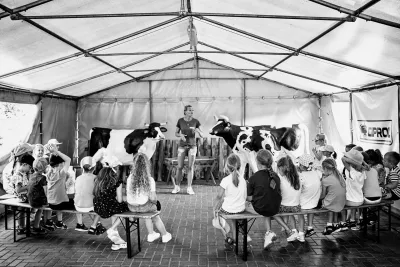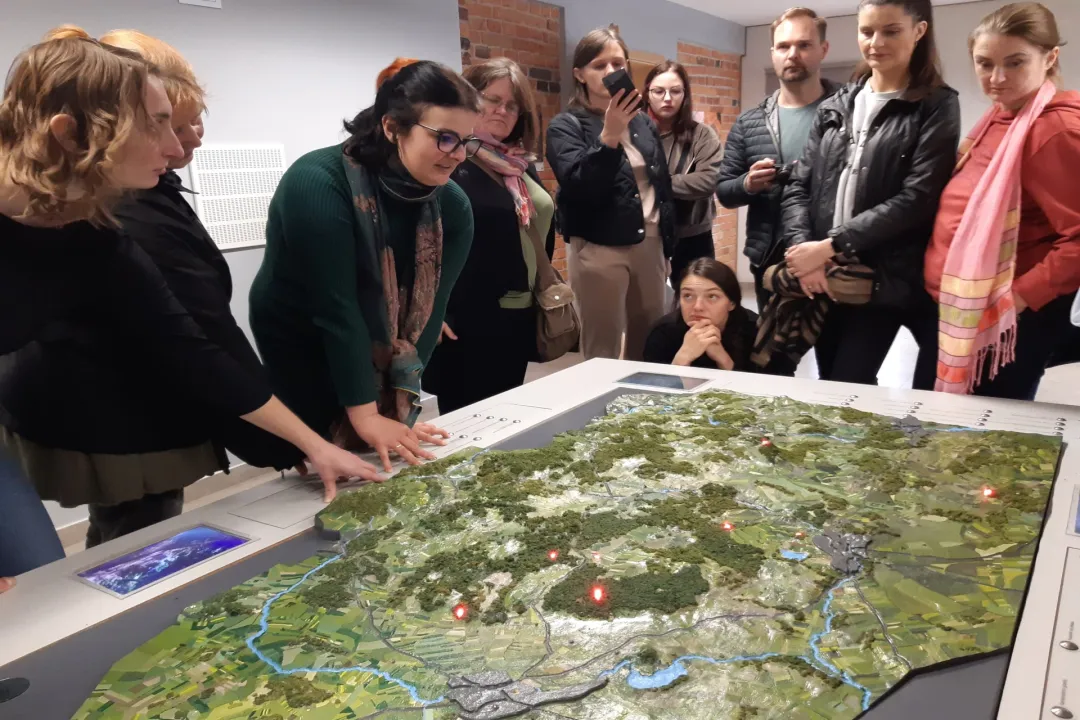General information
RDP Priority
- P1. Knowledge transfer and innovation
RDP Focus Area
- 1A: Innovation & cooperation
RDP Measure
- M20: Technical assistance
Beneficiary type
- Public authority / body
Summary
Small farms in the EU have numerous opportunities to diversify, including by offering educational services that emphasise sustainability and community engagement. By implementing workshops on different rural land management practices or developing agritourism ventures, these farms can create new revenue streams while simultaneously enriching public understanding of agriculture's role in society.
A novel use of CAP funds in Poland successfully promoted these opportunities for a farm diversification project. It built the capacity of farmers to provide regular education and training services, hands-on resources, and specialised facilities. Demand was identified from different farming communities for better knowledge about diversification opportunities for Educational Farms.
Schools and universities, as well as educational curriculum authorities, LEADER LAGs, and NGOs, participated in achieving their collective aims to develop rural entrepreneurship and social agriculture. The project team note that their support from the CAP for Education Farms translates into durable support to future generations.
Results
- 624 participants took part in the training activities.
- 600 school class teachers and kindergarten group tutors were surveyed, as were 50 owners of Education Farms. Qualitative research (in-depth interviews) covered a group of 40 teachers and 5 educational farm owners.
- Findings developed practical guidelines for establishing lasting cooperation between educational institutions and Education Farms.
- 100 stakeholders gained printed information about the project in a scientific monograph entitled ‘Educational farms in the social farming system’.
- Education benefits resulted from the development of Education Farms through the possibility of implementing the core curriculum in alternative places of education.

Promoter
Kujawsko-Pomorski Agricultural Advisory Centre
Funding
RDP support: 69 476 (EUR)
EAFRD: 44 208 (EUR)
National/Regional: 25 268 (EUR)
Ressources
Liens
Context
Small farms in the EU can face challenges from fluctuating market prices, climate change, and increasing competition from larger agricultural enterprises. As a response, diversifying into commercial education services can be a viable and profitable alternative to traditional livestock or other small farm income streams. By commercialising their unique resources and knowledge, small farms can transform themselves into educational hubs that cater to diverse audiences interested in the likes of sustainable food systems or rural heritage, for instance.
Farm-based education services and training facilities offer an effective strategy for diversification. Small farms can harness and enhance their existing infrastructure to offer hands-on experiences for applied teaching in practice across all ages, from schools to higher education and throughout lifelong learning.
Such a scale of new market opportunities for small farm diversification can generate additional income, as well as promote awareness about food systems and farming insights among participants. Partnering with schools, other education or training providers, and community organisations can further enhance visibility and attract more farm income.
Poland’s Kuyavian-Pomeranian Agricultural Advisory Centre found that its support for the National Network of Educational Farms had improved farming communities’ tourism revenues, but educational outcomes could be improved. The Centre in Minikowo saw rural development potential in strengthening farmers’ diversification skills with better knowledge about the commercial educational potential of smallholdings.
LEADER funds were identified as useful and unique sources of support for a novel project that might not have been considered eligible for other forms of EU or national funding.
Objectives
An overall aim for this LEADER project was to help Poland’s public education system increase its appreciation of farms’ values as educational resources. There was also an aim to reduce risks that some teachers could view farm visits as more of a vacation treat, rather than an opportunity to demonstrate curriculum topics in real-life situations. The project was designed to provide training and education materials to help reduce such risks, in addition to:
- transferring specialist knowledge to agri-tourism facilities interested in, or already involved in, using agricultural resources for educating school groups.
- supporting the process of establishing lasting cooperation between Education Farms and educational institutions by conducting research on the needs and possibilities of teachers and farmers.
- inspiring an increase in the number of Education Farms in Poland, and supporting the implementation of the national curriculum for schools and kindergartens in cooperation with educational institutions.
Activities
Training and other rural development activities supported by LEADER involved the following timeline.
September/October 2022: four training courses (Kujawsko-Pomorskie, Lubuskie, Opolskie and Zachodniopomorskie voivodeships) providing basic information on the activities of Education Farms – legal regulations, criteria for membership in the National Network of Educational Farms, forms of co-financing for the activities of the educational farm, including LEADER.
October 2022: online training in designing farm-based educational content based on the school curriculum and the farm’s resources.
November 2022: online training and information meeting on legal regulations applicable to Education Farms.
January/February 2023: five online pedagogical training courses by the project’s accredited teacher training institutions built capacity on:
- basics of pedagogy, education and upbringing, basics of teaching, principles and methods of teaching and learning.
- group management, group process management, teamwork, building a relationship.
- elements of psychology, human development periods and learning opportunities and needs.
- conflict situations in the learning process - how to solve them and build win-win relationships.
- educational project methods - principles of creation and implementation.
March 2023: two-day online training on business marketing for Education Farms.
March 2023: online training explaining the possibility of using NGOs and similar business models to run an educational farm.
April 2023: 4-day study trip highlighting good practices in Education Farms in Lower Silesia (the voivodeship with the largest number of facilities in the National Network of Educational Farms), visiting three Education Farms involved with a "Land of Extinct Volcanoes" initiative.
May 2023: online training and information meeting covering marketing, designing educational programmes, legal regulations, and NGO systems.
October 2023: online conference summarising the project, during which the participant experiences and research results were presented, along with proposed guidelines for establishing lasting cooperation between Education Farms and education. Workshops were held to network education, Education Farms, and youth. Collectively, they identified critical points of lasting cooperation.
Parallel to the above project training activities, research was carried out on the possibility of establishing lasting cooperation between Education Farms and educational institutions (divided into: kindergarten, grades I-III of the Primary School, grades IV-VIII of the Primary School, high school/technical school).
Both quantitative survey-based research and qualitative research (in-depth telephone interviews with teachers and owners of the Education Farms) were conducted. The visits to five Education Farms were documented.
A scientific monograph was created containing a detailed discussion of the research and its results, an overview of current solutions, and practical recommendations for building the above-described cooperation.
Main results
- 624 participants took part in the training activities. Individuals who wanted to undertake educational activities on a farm gained access to specialist knowledge. The training was proposed in a way to cover every important aspect of this activity, to help in its start and subsequent development.
- 600 school class teachers and kindergarten group tutors were surveyed, as were 50 owners of Education Farms. Qualitative research (in-depth interviews) covered a group of 40 teachers and 5 educational farm owners. Findings developed practical guidelines for establishing lasting cooperation between educational institutions and Education Farms, the use of which in the expansion of the network of Education Farms will help farms reduce the relationship between profit and the seasonality of agricultural production.
- 100 stakeholders (including representatives of educational institutions and directors of Voivodeships' Agricultural Advisory Units from all over Poland) gained printed information about the project in a scientific monograph entitled Educational Farms in the social farming system.
- Education benefits resulted from the development of Education Farms through the possibility of implementing the core curriculum in alternative places of education.
Key lessons
- Diversification of rural economies continues to increase in relevance for their resilience, and farm diversification is an opportunity offering infinite possibilities. These include farm-based education services.
- Many farm owners were interested in expanding their business profile to include educational activities. There was a great demand for training in this field, especially regarding legal regulations, creating educational programmes, marketing and sales communication.
- Education providers showed great interest in such farm-based services, and educators see an opportunity to establish permanent cooperation, especially if the visits are related to the implementation of the national curriculum. It is worth continuing this project, emphasising the educational and social needs of children and youth.
We are most proud of the attitude of farmers who are willing to introduce changes in their facilities to improve the provision of valuable services to children and school youth. Increasing numbers of Education Farms will translate into job creation, which in the long term will counteract the outflow of population from rural areas and contribute to the preservation of rural areas’ traditional landscape, such as many farms with various types of production and husbandry supporting organic systems and native livestock breeds.
What I will remember most from the study trip are the workshops, because working with people empowers you.
Aleksandra Hapka

